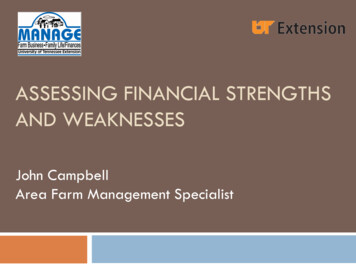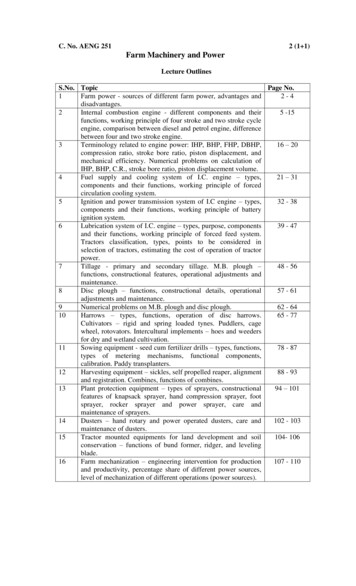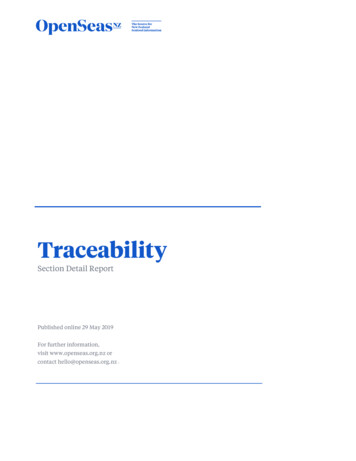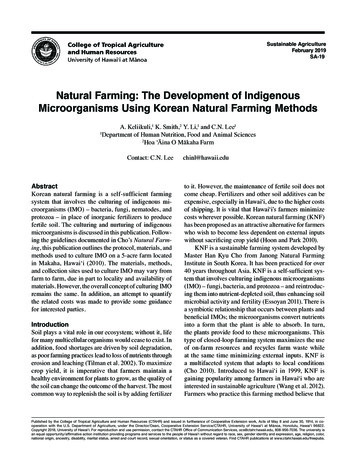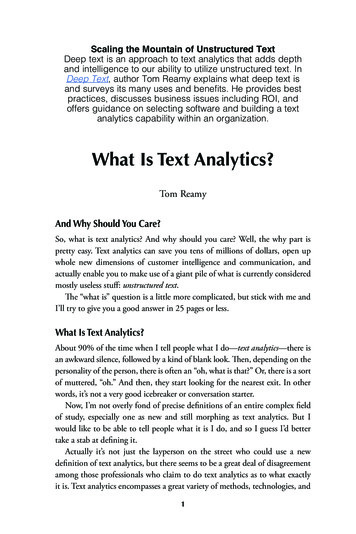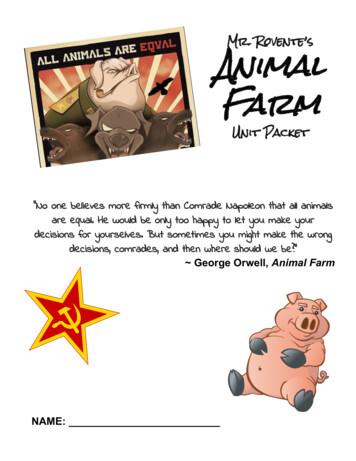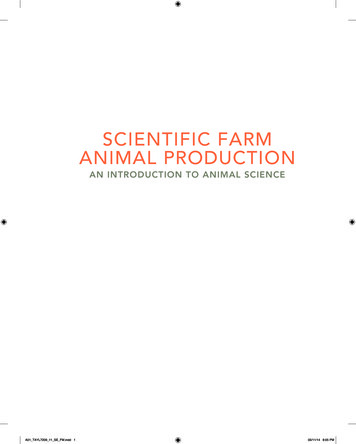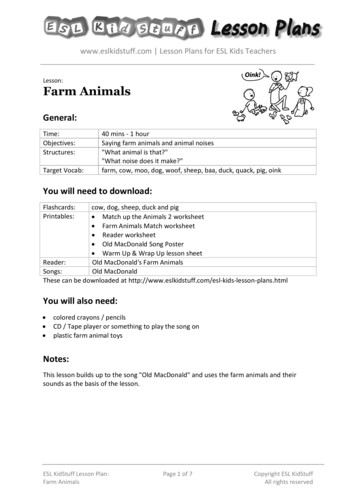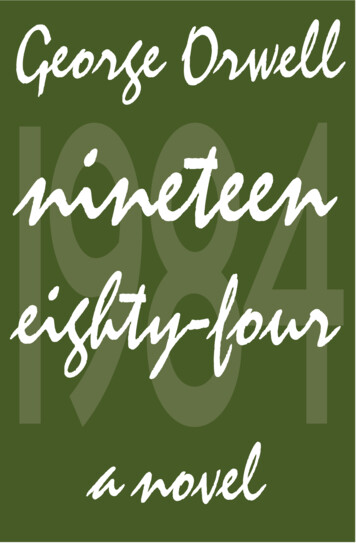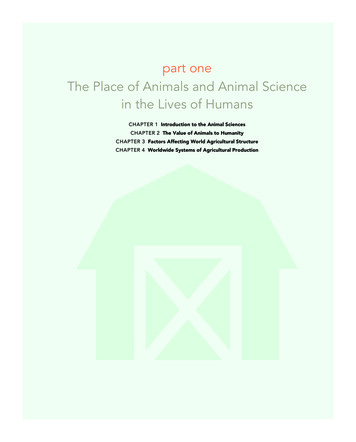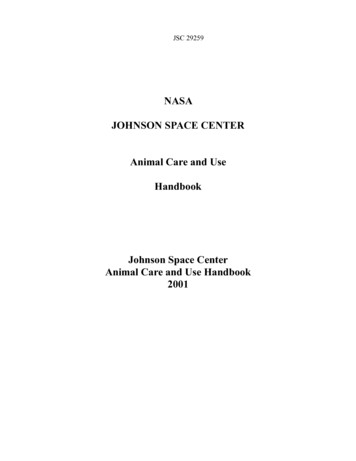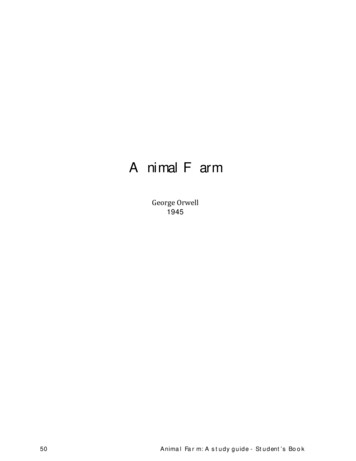
Transcription
Animal FarmGeorge Orwell194550Animal Farm: A study guide - Student’s Book
IMr. Jones, of the Manor Farm, had lockedthe hen-houses for the night, but was too drunk toremember to shut the popholes. With the ring oflight from his lantern dancing from side to side, helurched across the yard, kicked off his boots at theback door, drew himself a last glass of beer fromthe barrel in the scullery, and made his way up tobed, where Mrs. Jones was already snoring.As soon as the light in the bedroomthrough the farm buildings. Word had gone roundduring the day that old Major, the prize MiddleWhite boar, had a strange dream on the previousnight and wished to communicate it to the otheranimals. It had been agreed that they should allmeet in the big barn as soon as Mr. Jones wassafely out of the way. Old Major (so he was alwayscalled, though the name under which he had beenexhibited was Willingdon Beauty) was so highlyregarded on the farm that everyone was quiteready to lose an hour’s sleep in order to hear whathe had to say.At one end of the big barn, on a sort ofraised platform, Major was already ensconcedon his bed of straw, under a lantern which hungfrom a beam. He was twelve years old and hadlately grown rather stout, but he was still amajestic- looking pig, with a wise and benevolentappearance in spite of the fact that his tushes hadnever been cut. Before long the other animalsbegan to arrive and make themselves comfortableafter their different fashions. First came thethree dogs, Bluebell, Jessie, and Pincher, andthen the pigs, who settled down in the strawimmediately in front of the platform. The hensperched themselves on the window-sills, thecows lay down behind the pigs and began to chewthe cud. The two cart-horses, Boxer and Clover,came in together, walking very slowly and settingdown their vast hairy hoofs with great care lestthere should be some small animal concealedin the straw. Clover was a stout motherly mareapproaching middle life, who had never quitehigh, and as strong as any two ordinary horsesput together. A white stripe down his nosegave him a somewhat stupid appearance, andhe was universally respected for his steadinessof character and tremendous powers of work.After the horses came Muriel, the white goat, andBenjamin, the donkey. Benjamin was the oldestanimal on the farm, and the worst tempered. Heseldom talked, and when he did, it was usuallyto make some cynical remark — for instance, hewould say that God had given him a tail to keepthe farm he never laughed. If asked why, he wouldsay that he saw nothing to laugh at. Nevertheless,without openly admitting it, he was devotedto Boxer; the two of them usually spent theirSundays together in the small paddock beyond theorchard, grazing side by side and never speaking.The two horses had just lain down whena brood of ducklings, which had lost their mother,would not be trodden on. Clover made a sort ofwall round them with her great foreleg, and theducklings nestled down inside it and promptlyfell asleep. At the last moment Mollie, the foolish,pretty white mare who drew Mr. Jones’ trap,came mincing daintily in, chewing at a lump ofsugar. She took a place near the front and beganto the red ribbons it was plaited with. Last of allcame the cat, who looked round, as usual, forin between Boxer and Clover; there she purredcontentedly throughout Major’s speech withoutlistening to a word of what he was saying.All the animals were now present exceptMoses, the tame raven, who slept on a perchbehind the back door. When Major saw that theyhad all made themselves comfortable and werewaiting attentively, he cleared his throat andbegan:‘Comrades, you have heard already aboutthe strange dream that I had last night. But I willcome to the dream later. I have something else towas an enormous beast, nearly eighteen handsAnimal Farm: A study guide - Student’s Book51
with you for many months longer, and before I die,I feel it my duty to pass on to you such wisdom asI have acquired. I have had a long life, I have hadmuch time for thought as I lay alone in my stall,and I think I may say that I understand the natureof life on this earth as well as any animal nowliving. It is about this that I wish to speak to you.‘Now, comrades, what is the nature of thislife of ours? Let us face it: our lives are miserable,laborious, and short. We are born, we are givenjust so much food as will keep the breath in ourbodies, and those of us who are capable of it areforced to work to the last atom of our strength;and the very instant that our usefulness hascome to an end we are slaughtered with hideouscruelty. No animal in England knows the meaningof happiness or leisure after he is a year old. Noanimal in England is free. The life of an animal ismisery and slavery: that is the plain truth.‘But is this simply part of the order ofnature? Is it because this land of ours is so poorthat it cannot afford a decent life to those whodwell upon it? No, comrades, a thousand times no!The soil of England is fertile, its climate is good,it is capable of affording food in abundance to anenormously greater number of animals than nowinhabit it. This single farm of ours would supporta dozen horses, twenty cows, hundreds of sheep— and all of them living in a comfort and a dignitythat are now almost beyond our imagining. Whythen do we continue in this miserable condition?Because nearly the whole of the produce of ourlabour is stolen from us by human beings. There,comrades, is the answer to all our problems. It issummed up in a single word — Man. Man is theonly real enemy we have. Remove Man from thescene, and the root cause of hunger and overworkis abolished for ever.‘Man is the only creature that consumeswithout producing. He does not give milk, he doesnot lay eggs, he is too weak to pull the plough, hecannot run fast enough to catch rabbits. Yet he islord of all the animals. He sets them to work, hegives back to them the bare minimum that willprevent them from starving, and the rest he keepsfor himself. Our labour tills the soil, our dungfertilises it, and yet there is not one of us thatowns more than his bare skin. You cows that I see52before me, how many thousands of gallons of milkhave you given during this last year? And whathas happened to that milk which should havebeen breeding up sturdy calves? Every drop of ithas gone down the throats of our enemies. Andyou hens, how many eggs have you laid in this lastyear, and how many of those eggs ever hatchedinto chickens? The rest have all gone to market tobring in money for Jones and his men. And you,Clover, where are those four foals you bore, whoshould have been the support and pleasure ofyour old age? Each was sold at a year old — youwill never see one of them again. In return forrations and a stall?‘And even the miserable lives we leadare not allowed to reach their natural span. Formyself I do not grumble, for I am one of the luckyones. I am twelve years old and have had overfour hundred children. Such is the natural life ofa pig. But no animal escapes the cruel knife in theend. You young porkers who are sitting in frontof me, every one of you will scream your lives outat the block within a year. To that horror we allmust come — cows, pigs, hens, sheep, everyone.Even the horses and the dogs have no better fate.You, Boxer, the very day that those great musclesof yours lose their power, Jones will sell you tothe knacker, who will cut your throat and boil youdown for the foxhounds. As for the dogs, whenthey grow old and toothless, Jones ties a brickround their necks and drowns them in the nearestpond.‘Is it not crystal clear, then, comrades, thatall the evils of this life of ours spring from thetyranny of human beings? Only get rid of Man,and the produce of our labour would be our own.Almost overnight we could become rich and free.What then must we do? Why, work night and day,body and soul, for the overthrow of the humanrace! That is my message to you, comrades:Rebellion! I do not know when that Rebellion willcome, it might be in a week or in a hundred years,but I know, as surely as I see this straw beneathmy feet, that sooner or later justice will be done.Fix your eyes on that, comrades, throughout theshort remainder of your lives! And above all, passAnimal Farm: A study guide - Student’s Book
on this message of mine to those who come afteryou, so that future generations shall carry on thestruggle until it is victorious.‘And remember, comrades, your resolution mustnever falter. No argument must lead you astray.Never listen when they tell you that Man andthe animals have a common interest, that theprosperity of the one is the prosperity of theothers. It is all lies. Man serves the interests of nocreature except himself. And among us animalslet there be perfect unity, perfect comradeship inthe struggle. All men are enemies. All animals arecomrades.’At this moment there was a tremendousuproar. While Major was speaking four large ratshad crept out of their holes and were sitting ontheir hindquarters, listening to him. The dogs hadsuddenly caught sight of them, and it was onlyby a swift dash for their holes that the rats savedtheir lives. Major raised his trotter for silence.‘Comrades,’ he said, ‘here is a point thatmust be settled. The wild creatures, such asrats and rabbits — are they our friends or ourenemies? Let us put it to the vote. I propose thisquestion to the meeting: Are rats comrades?’The vote was taken at once, and it wasagreed by an overwhelming majority that ratswere comrades. There were only four dissentients,the three dogs and the cat, who was afterwardsdiscovered to have voted on both sides. Majorcontinued: ‘I have little more to say. I merelyrepeat, remember always your duty of enmitytowards Man and all his ways. Whatever goesupon two legs is an enemy. Whatever goes uponfour legs, or has wings, is a friend. And rememberdream to you. It was a dream of the earth as itwill be when Man has vanished. But it remindedme of something that I had long forgotten. Manyyears ago, when I was a little pig, my mother andthe other sows used to sing an old song of whichI had known that tune in my infancy, but it hadlong since passed out of my mind. Last night,however, it came back to me in my dream. Andwhat is more, the words of the song also cameback — words, I am certain, which were sungby the animals of long ago and have been lost tomemory for generations. I will sing you that songnow, comrades. I am old and my voice is hoarse,but when I have taught you the tune, you cansing it better for yourselves. It is called Beasts ofEngland.’Old Major cleared his throat and beganto sing. As he had said, his voice was hoarse, buthe sang well enough, and it was a stirring tune,something between Clementine and La Cucaracha.The words ran:come to resemble him. Even when you haveconquered him, do not adopt his vices. No animalmust ever live in a house, or sleep in a bed, orwear clothes, or drink alcohol, or smoke tobacco,or touch money, or engage in trade. All the habitsof Man are evil. And, above all, no animal mustever tyrannise over his own kind. Weak or strong,clever or simple, we are all brothers. No animalmust ever kill any other animal. All animals areequal.‘And now, comrades, I will tell you aboutmy dream of last night. I cannot describe thatAnimal Farm: A study guide - Student’s Book53
and organising the others fell naturally upon thepigs, who were generally recognised as beingthe cleverest of the animals. Pre-eminent amongthe pigs were two young boars named Snowballand Napoleon, whom Mr. Jones was breedingThe singing of this song threw the animalsinto the wildest excitement. Almost before Majorhad reached the end, they had begun singing itfor them- selves. Even the stupidest of them hadalready picked up the tune and a few of the words,and as for the clever ones, such as the pigs anddogs, they had the entire song by heart within afew minutes. And then, after a few preliminarytries, the whole farm burst out into Beasts ofEngland in tremendous unison. The cows lowedit, the dogs whined it, the sheep bleated it, thehorses whinnied it, the ducks quacked it. Theywere so delighted with the song that they sang ithave continued singing it all night if they had notbeen interrupted.Unfortunately, the uproar awoke Mr. Jones, whosprang out of bed, making sure that there was afox in the yard. He seized the gun which alwayscharge of number 6 shot into the darkness. Thepellets buried themselves in the wall of the barnand the meeting broke up hurriedly. Everyoneon to their perches, the animals settled down inthe straw, and the whole farm was asleep in amoment.IIThree nights later old Major diedpeacefully in his sleep. His body was buried at thefoot of the orchard.This was early in March. During the nextthree months there was much secret activity.Major’s speech had given to the more intelligentanimals on the farm a completely new outlookon life. They did not know when the Rebellionpredicted by Major would take place, they hadno reason for thinking that it would be withintheir own lifetime, but they saw clearly that it wastheir duty to prepare for it. The work of teaching54looking Berkshire boar, the only Berkshire on thefarm, not much of a talker, but with a reputationfor getting his own way. Snowball was a morevivacious pig than Napoleon, quicker in speechand more inventive, but was not considered tohave the same depth of character. All the othermale pigs on the farm were porkers. The bestknown among them was a small fat pig namedSquealer, with very round cheeks, twinkling eyes,nimble movements, and a shrill voice. He was abrilliant talker, and when he was arguing someto side and whisking his tail which was somehowvery persuasive. The others said of Squealer thathe could turn black into white.These three had elaborated old Major’steachings into a complete system of thought, towhich they gave the name of Animalism. Severalnights a week, after Mr. Jones was asleep, theyheld secret meetings in the barn and expoundedthe principles of Animalism to the others. At thebeginning they met with much stupidity andapathy. Some of the animals talked of the dutyof loyalty to Mr. Jones, whom they referred to as‘Master,’ or made elementary remarks such as ‘Mr.Jones feeds us. If he were gone, we should starveto death.’ Others asked such questions as ‘Whyshould we care what happens after we are dead?’or ‘If this Rebellion is to happen anyway, whatdifference does it make whether we work for it orthem see that this was contrary to the spirit ofAnimalism. The stupidest questions of all werequestion she asked Snowball was: ‘Will there stillbe sugar after the Rebellion? ’means of making sugar on this farm. Besides, youdo not need sugar. You will have all the oats andhay you want.’‘And shall I still be allowed to wear ribbonsin my mane?’ asked Mollie.Animal Farm: A study guide - Student’s Book
‘Comrade,’ said Snowball, ‘those ribbonsthat you are so devoted to are the badge of slavery.Can you not understand that liberty is worth morethan ribbons?’Mollie agreed, but she did not sound veryconvinced.The pigs had an even harder struggle tocounteract the lies put about by Moses, the tameraven. Moses, who was Mr. Jones’ especial pet, wasa spy and a tale-bearer, but he was also a clevertalker. He claimed to know of the existence of amysterious country called Sugarcandy Mountain,to which all animals went when they died. It wassituated somewhere up in the sky, a little distancebeyond the clouds, Moses said. In SugarcandyMountain it was Sunday seven days a week, cloverwas in season all the year round, and lump sugarand linseed cake grew on the hedges. The animalshated Moses because he told tales and did nowork, but some of them believed in SugarcandyMountain, and the pigs had to argue very hard topersuade them that there was no such place.Their most faithful disciples were thetwo cart-horses, Boxer and Clover. These twothemselves, but having once accepted the pigs astheir teachers, they absorbed everything that theywere told, and passed it on to the other animalsby simple arguments. They were unfailing in theirattendance at the secret meetings in the barn, andled the singing of Beasts of England, with whichthe meetings always ended.Now, as it turned out, the Rebellion wasachieved much earlier and more easily thananyone had expected. In past years Mr. Jones,although a hard master, had been a capablefarmer, but of late he had fallen on evil days.He had become much disheartened after losingmoney in a lawsuit, and had taken to drinkingmore than was good for him. For whole days at atime he would lounge in his Windsor chair in thekitchen, reading the newspapers, drinking, andoccasionally feeding Moses on crusts of breadsoaked in beer. His men were idle and dishonest,June came and the hay was almost ready forcutting. On Midsummer’s Eve, which was aSaturday, Mr. Jones went into Willingdon and gotso drunk at the Red Lion that he did not comeback till midday on Sunday. The men had milkedthe cows in the early morning and then had goneout rabbiting, without bothering to feed theanimals. When Mr. Jones got back he immediatelywent to sleep on the drawing-room sofa with theNews of the World over his face, so that whenevening came, the animals were still unfed. Atlast they could stand it no longer. One of the cowsbroke in the door of the store-shed with her hornand all the animals began to help themselves fromthe bins. It was just then that Mr. Jones woke up.The next moment he and his four men were in thestore-shed with whips in their hands, lashing outin all directions. This was more than the hungryanimals could bear. With one accord, thoughnothing of the kind had been planned beforehand,Jones and his men suddenly found themselvesbeing butted and kicked from all sides. Thesituation was quite out of their control. They hadnever seen animals behave like this before, andthis sudden uprising of creatures whom they wereused to thrashing and maltreating just as theychose, frightened them almost out of their wits.After only a moment or two they gave up tryingto defend themselves and took to their heels. Adown the cart-track that led to the main road,with the animals pursuing them in triumph.Mrs. Jones looked out of the bedrooma few possessions into a carpet bag, and slippedout of the farm by another way. Moses sprang offMeanwhile the animals had chased Jones and hisbarred gate behind them. And so, almost beforethey knew what was happening, the Rebellionhad been successfully carried through: Jones wasexpelled, and the Manor Farm was theirs.could hardly believe in their good fortune. Theiranimals were underfed.boundaries of the farm, as though to make quiteAnimal Farm: A study guide - Student’s Book55
sure that no human being was hiding anywhereupon it; then they raced back to the farm buildingsto wipe out the last traces of Jones’ hated reign.The harness-room at the end of the stables wasbroken open; the bits, the nose-rings, the dogchains, the cruel knives with which Mr. Jones hadbeen used to castrate the pigs and lambs, wereblinkers, the degrading nosebags, were thrown onSo were the whips. All the animals capered withwith which the horses’ manes and tails hadusually been decorated on market days.‘Ribbons,’ he said, ‘should be considered asclothes, which are the mark of a human being. Allanimals should go naked.’When Boxer heard this he fetched thesmall straw hat which he wore in summer to keepwith the rest.In a very little while the animals haddestroyed everything that reminded them of Mr.Jones. Napoleon then led them back to the storeshed and served out a double ration of corn toeverybody, with two biscuits for each dog. Thenthey sang Beasts of England from end to end seventimes running, and after that they settled down forthe night and slept as they had never slept before.But they woke at dawn as usual, andsuddenly remembering the glorious thing thathad happened, they all raced out into the pasturetogether. A little way down the pasture therewas a knoll that commanded a view of mostof the farm. The animals rushed to the top ofit and gazed round them in the clear morninglight. Yes, it was theirs — everything that theycould see was theirs! In the ecstasy of thatthought they gambolled round and round, theyhurled themselves into the air in great leaps ofexcitement. They rolled in the dew, they croppedmouthfuls of the sweet summer grass, they kickedup clods of the black earth and snuffed its richscent. Then they made a tour of inspection ofthe whole farm and surveyed with speechlessorchard, the pool, the spinney. It was as though56they had never seen these things before, and evennow they could hardly believe that it was all theirown.and halted in silence outside the door of thefarmhouse. That was theirs too, but they werefrightened to go inside. After a moment, however,Snowball and Napoleon butted the door openwith their shoulders and the animals entered inof disturbing anything. They tiptoed from roomto room, afraid to speak above a whisper andgazing with a kind of awe at the unbelievableluxury, at the beds with their feather mattresses,the looking- glasses, the horsehair sofa, theBrussels carpet, the lithograph of Queen Victoriaover the drawing-room mantelpiece. They werelust coming down the stairs when Mollie wasdiscovered to be missing. Going back, the othersfound that she had remained behind in the bestbedroom. She had taken a piece of blue ribbonfrom Mrs. Jones’ dressing-table, and was holdingit against her shoulder and admiring herself inthe glass in a very foolish manner. The othersreproached her sharply, and they went outside.Some hams hanging in the kitchen were taken outfor burial, and the barrel of beer in the scullerywas stove in with a kick from Boxer’s hoof, —otherwise nothing in the house was touched. Aunanimous resolution was passed on the spot thatthe farmhouse should be preserved as a museum.All were agreed that no animal must ever livethere.The animals had their breakfast, and thenSnowball and Napoleon called them togetheragain.‘Comrades,’ said Snowball, ‘it is half-pastsix and we have a long day before us. Today webegin the hay harvest. But there is another matterThe pigs now revealed that during thepast three months they had taught themselves toread and write from an old spelling book whichhad belonged to Mr. Jones’ children and whichhad been thrown on the rubbish heap. Napoleonsent for pots of black and white paint and ledon to the main road. Then Snowball (for it wasAnimal Farm: A study guide - Student’s Book
Snowball who was best at writing) took a brushbetween the two knuckles of his trotter, paintedout MANOR FARM from the top bar of the gateand in its place painted ANIMAL FARM. This wasto be the name of the farm from now onwards.After this they went back to the farm buildings,where Snowball and Napoleon sent for a ladderwhich they caused to be set against the end wall ofthe big barn. They explained that by their studiesof the past three months the pigs had succeededin reducing the principles of Animalism to SevenCommandments. These Seven Commandmentswould now be inscribed on the wall; they wouldform an unalterable law by which all the animalson Animal Farm must live for ever after. Withbalance himself on a ladder) Snowball climbed upand set to work, with Squealer a few rungs belowhim holding the paint-pot. The Commandmentswere written on the tarred wall in great whiteletters that could be read thirty yards away. Theyran thus:friend.It was very neatly written, and except that‘friend’ was written ‘freind’ and one of the ‘S’’ wasthe wrong way round, the spelling was correctall the way through. Snowball read it aloud forin complete agreement, and the cleverer ones atonce began to learn the Commandments by heart.‘Now, comrades,’ cried Snowball, throwingmake it a point of honour to get in the harvestmore quickly than Jones and his men could do.’But at this moment the three cows, whohad seemed uneasy for some time past, set up aloud lowing. They had not been milked for twentyfour hours, and their udders were almost bursting.After a little thought, the pigs sent for buckets andmilked the cows fairly successfully, their trottersbeing well adapted to this task. Soon there weremany of the animals looked with considerableinterest.‘What is going to happen to all that milk?’said someone.‘Jones used sometimes to mix some of it inour mash,’ said one of the hens.‘Never mind the milk, comrades!’ criedNapoleon, placing himself in front of the buckets.‘That will be attended to. The harvest is moreimportant. Comrade Snowball will lead the way. Ishall follow in a few minutes. Forward, comrades!The hay is waiting.’So the animals trooped down to theback in the evening it was noticed that the milkhad disappeared.IIIHow they toiled and sweated to get thehay in! But their efforts were rewarded, for theharvest was an even bigger success than they hadhoped.Sometimes the work was hard; theimplements had been designed for humanbeings and not for animals, and it was a greatdrawback that no animal was able to use anytool that involved standing on his hind legs. Butthe pigs were so clever that they could think ofunderstood the business of mowing and rakingfar better than Jones and his men had ever done.The pigs did not actually work, but directedand supervised the others. With their superiorknowledge it was natural that they should assumethe leadership. Boxer and Clover would harnessthemselves to the cutter or the horse-rake (nobits or reins were needed in these days, of course)with a pig walking behind and calling out ‘Gee up,comrade!’ or ‘Whoa back, comrade!’ as the casemight be. And every animal down to the humblestworked at turning the hay and gathering it. EvenAnimal Farm: A study guide - Student’s Book57
the ducks and hens toiled to and fro all day in thesun, carrying tiny wisps of hay in their beaks. Intime than it had usually taken Jones and his men.Moreover, it was the biggest harvest that the farmhad ever seen. There was no wastage whatever;the hens and ducks with their sharp eyes hadgathered up the very last stalk. And not an animalon the farm had stolen so much as a mouthful.All through that summer the work ofthe farm went like clockwork. The animals werehappy as they had never conceived it possible tobe. Every mouthful of food was an acute positivepleasure, now that it was truly their own food,produced by themselves and for themselves, notdoled out to them by a grudging master. With theworthless parasitical human beings gone, therewas more for everyone to eat. There was moreleisure too, inexperienced though the animalsinstance, later in the year, when they harvestedthe corn, they had to tread it out in the ancientstyle and blow away the chaff with their breath,since the farm possessed no threshing machine— but the pigs with their cleverness and Boxerwith his tremendous muscles always pulled themthrough. Boxer was the admiration of everybody.He had been a hard worker even in Jones’ time,but now he seemed more like three horses thanone; there were days when the entire work ofthe farm seemed to rest on his mighty shoulders.From morning to night he was pushing andpulling, always at the spot where the work washardest. He had made an arrangement with one ofthe cockerels to call him in the mornings half anhour earlier than anyone else, and would put insome volunteer labour at whatever seemed to bemost needed, before the regular day’s work began.His answer to every problem, every setback, was ‘Iwill work harder!’ — which he had adopted as hispersonal motto.But everyone worked according to hiscapacity. The hens and ducks, for instance, savedthe stray grains. Nobody stole, nobody grumbledover his rations, the quarrelling and biting andjealousy which had been normal features of lifein the old days had almost disappeared. Nobody58shirked — or almost nobody. Mollie, it was true,was not good at getting up in the mornings, andhad a way of leaving work early on the ground thatthere was a stone in her hoof. And the behaviourof the cat was somewhat peculiar. It was soonnoticed that when there was work to be done thecat could never be found. She would vanish forhours on end, and then reappear at meal-times,or in the evening after work was over, as thoughnothing had happened. But she always made suchexcellent excuses, and purred so affectionately,that it was impossible not to believe in her goodintentions. Old Benjamin, the donkey, seemedquite unchanged since the Rebellion. He did hiswork in the same slow obstinate way as he haddone it in Jones’ time, never shirking and nevervolunteering for work either. About the Rebellionand its results he would express no opinion. Whenasked whether he was not happier now that Joneswas gone, he would say only ‘Donkeys live a longtime. None of you has ever seen a dead donkey,’and the others had to be content with this crypticanswer.On Sundays there was no work. Breakfastwas an hour later than usual, and after breakfastthere was a ceremony which was observed everyweek without fail. First came the hoisting of thean old green tablecloth of Mrs. Jones’ and hadpainted on it a hoof and a horn in white. Thisthe future Republic of the Animals which wouldanimals trooped into the big barn for a generalassembly which was known as the Meeting. Herethe work of the coming week was planned outand resolutions were put forward and debated.It was always the pigs who put forward theresolutions. The other animals understood howto vote, but could never think of any resolutionsof their own. Snowball and Napoleon were by farthe most active in the debates. But it was noticedthat these two were never in agreement: whateversuggestion either of them made, the other couldAnimal Farm: A study guide - Student’s Book
be counted on to oppose it. Even when it wasresolved — a thing no one could object to initself — to set aside the small paddock behind theorchard as a home of rest for animals who werepast work, there was a stormy
Animal Farm: A study guide - Student’s Book 51. with you for many months longer, and before I die, I feel it my duty to pass on to you such wisdom as . animal in England is free. The life of an animal is misery and slavery: that is
